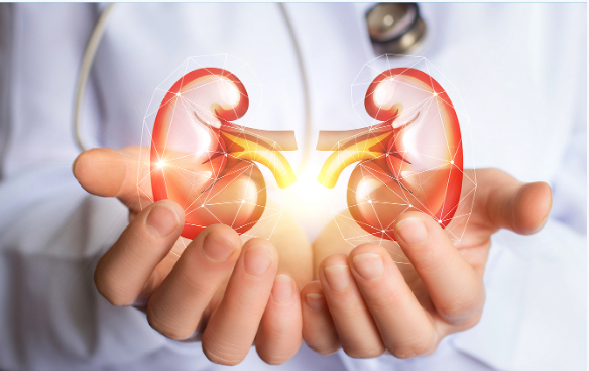Staying Alert: Early Detection of Kidney Problems
Posted by Just Fitter on
Kidneys are essential to having a healthy body. They impact on most of our body functions that if left untreated, can lead to death.
So, what makes kidneys so important and how do they work? The major function of kidneys is the removal of wastes and extra fluid from the body. Kidneys also remove acid that is produced by the cells of the body and maintain a healthy balance of water, salts, and minerals—such as sodium, calcium, phosphorus, and potassium—in the blood. Without this balance, nerves, muscles, and other tissues in our body may not work normally.
There are two kidneys, each about the size of a fist, located on either side of the spine at the lowest level of the rib cage. Each kidney contains up to a million functioning units called nephrons. A nephron consists of a filtering unit of tiny blood vessels called a glomerulus attached to a tubule. When blood enters the glomerulus, it is filtered and the remaining fluid then passes along the tubule. In the tubule, chemicals and water are either added to or removed from this filtered fluid according to the body's needs, the final product being the urine we excrete.
In summary, the kidneys are powerful chemical factories that perform the following functions:
- remove waste products from the body
- remove drugs from the body
- balance the body's fluids
- release hormones that regulate blood pressure
- produce an active form of vitamin D that promotes strong, healthy bones
- control the production of red blood cells
Common Kidney Problems
Kidney disease affects approximately 26 million American adults. It occurs when our kidneys become damaged and can’t perform their function. Damage may be caused by diabetes, high blood pressure, and various other chronic (long-term) conditions. Kidney disease can lead to other health problems, including weak bones, nerve damage, and malnutrition.
If the disease gets worse over time, our kidneys may stop working completely. This means that dialysis will be required to perform the function of the kidneys. Dialysis is a treatment that filters and purifies the blood using a machine. It can’t cure kidney disease, but it can prolong your life.
Chronic Kidney Disease
The most common form of kidney disease is chronic kidney disease. Chronic kidney disease is a long-term condition that doesn’t improve over time. It’s commonly caused by high blood pressure. High blood pressure is dangerous for the kidneys because it can increase the pressure on the glomeruli. Glomeruli are the tiny blood vessels in the kidneys where blood is cleaned. Over time, the increased pressure damages these vessels and kidney function begins to decline. Kidney function will eventually deteriorate to the point where the kidneys can no longer perform their job properly. In this case, a person would need to go on dialysis. A kidney transplant may be another treatment option depending on your circumstances.
Diabetes is also a major cause of chronic kidney disease. Diabetes is a group of diseases that causes high blood sugar. The increased level of sugar in the blood damages the blood vessels in the kidneys over time. This means the kidneys can’t clean the blood properly. Kidney failure can occur when your body becomes overloaded with toxins.
Kidney Stones
Kidney stones are another common kidney problem. They occur when minerals and other substances in the blood crystallize in the kidneys, forming solid masses (stones). Kidney stones usually come out of the body during urination. Passing kidney stones can be extremely painful, but they rarely cause significant problems.
Glomerulonephritis
Glomerulonephritis is an inflammation of the glomeruli. Glomeruli are extremely small structures inside the kidneys that filter the blood. Glomerulonephritis can be caused by infections, drugs, or congenital abnormalities (disorders that occur during or shortly after birth). It often gets better on its own.
Polycystic Kidney Disease
Polycystic kidney disease is a genetic disorder that causes numerous cysts (small sacs of fluid) to grow in the kidneys. These cysts can interfere with kidney function and cause kidney failure. (It’s important to note that individual kidney cysts are fairly common and almost always harmless. Polycystic kidney disease is a separate, more serious condition.)
Urinary tract infections (UTIs) are bacterial infections of any part of the urinary system. Infections in the bladder and urethra are the most common. They are easily treatable and rarely lead to more health problems. However, if left untreated, these infections can spread to the kidneys and cause kidney failure.
What are the symptoms of kidney disease?
Kidney disease is a condition that can easily go unnoticed until the symptoms become severe. The following symptoms are early warning signs that you might be developing kidney disease:
- fatigue
- difficulty concentrating
- trouble sleeping
- poor appetite
- muscle cramping
- swollen feet/ankles
- puffiness around the eyes in the morning
- dry, scaly skin
- frequent urination, especially late at night
Given these facts, how can we avoid kidneys problems? Moreover, what can we do for our kidneys?
- Keep Fit, be active
- Eat a healthy diet
- Check and control your blood sugar
- Check and control your blood pressure
- Take appropriate fluid intake
- Don’t smoke
- Don’t take over-the-counter anti-inflammatory/pain-killer pills regularly
- Get your kidney function checked if you have one or more of the ‘high risk’ factors
- you have diabetes
- you have hypertension
- you are obese
- you have a family history of kidney disease
How are Kidney Diseases Diagnosed?
There are several types of tests to determine if your kidneys are functioning properly. Ultimately, it is your doctor who will recommend that you take these tests but, the most common and practical among them are urine tests since they are easily performed, convenient and readily available.
What is a Dipstick or Test Strip Urinalysis?
Urinalysis is a urine test best performed on a full bladder first thing in the morning. It checks appearance, concentration and content of urine and is used to detect and/or manage a wide range of medical disorders, such as urinary tract infections (UTI's), kidney disease and diabetes. A dipstick, usually a thin, plastic stick with strips of chemicals on it, is coated with urine and the chemical strips will change color if certain substances are present or if certain levels are above, or below, normal which can indicate the presence of compounds like proteins, ketones, hemoglobin, and nitrites, as well as harmful pathogens. Dipstick urinalysis is convenient, but false-positive and false-negative results can occur.
No preparation other than cleansing the area around the urethra (urinary opening) is required for the automated dipstick urinalysis.
What does a dipstick urinalysis check for?
Things the dipstick test can check for include:
- Acidity, or pH. If the acid is above normal, you could have kidney stones, a urinary tract infection or another condition.
- Protein. This can be a sign your kidneys are not working right. Kidneys filter waste products out of your blood, and your body needs protein.
- Glucose. A high sugar content is a marker for diabetes.
- White blood cells. These are a sign of infection.
- Bilirubin. If this waste product, which is normally eliminated by your liver, show up, it may mean your liver isn’t working properly.
- Blood in your urine. Sometimes this is a sign of infections or certain illnesses.
! An important note though that it is best to consult with a medical practitioner on the interpretation of the results
Color Chart for 10 Parameter Urinalysis Test

Conclusion:
Kidneys play a vital role in your body and are two of the hardest working organs that keep the whole system in balance. There are several known kidney related problems and most of them can be prevented. It is important to prevent these since worsened kidney problems puts your life at major risk. Early detection is always an advantage given that kidney problems remain unnoticed until the symptoms become severe. There are early detection test kits available which are very convenient, practical and can be performed at home. However, there is always a need to consult a doctor for a better interpretation of the detected abnormalities and for possible treatment.
Ultimately, Self discipline is the best thing at hand for remaining healthy. We must establish control over ourselves to stay fit and to better take care of our body. It would also help to educate ourselves because, the more we know, the smarter decisions we make.
References:
- https://www.niddk.nih.gov/health-information/kidney-disease/kidneys-how-they-work
- https://www.kidney.org/kidneydisease/howkidneyswrk
- https://www.kidney.org/kidneydisease/howkidneyswrk#where
- https://www.healthline.com/health/kidney-disease
- https://www.worldkidneyday.org/facts/take-care-of-your-kidneys/8-golden-rules/
- https://www.disabled-world.com/calculators-charts/urinalysis.php
- https://www.webmd.com/a-to-z-guides/qa/what-does-a-dipstick-urinalysis-check-for
- https://www.diagnoxhealth.com/10-parameter-urinalysis-test-at-home/
- https://www.westmedgroup.com/kidneys-small-powerful-organs-multitask/









